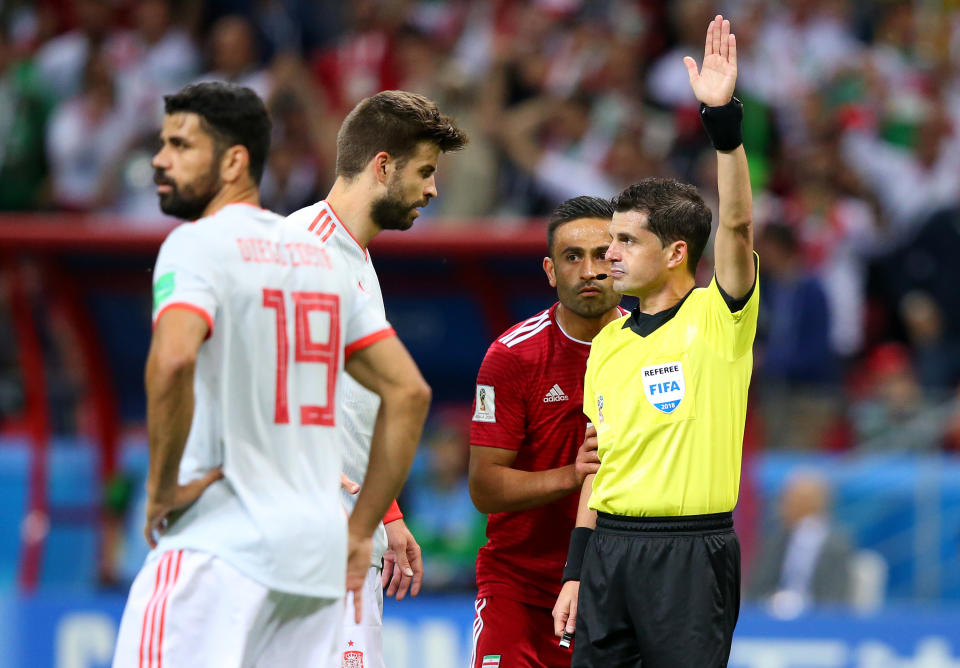World Cup Mystery Solved: What language do refs and players speak on the field?
In Wednesday’s World Cup Group Stage clash between Iran and Spain, we saw an Iranian goal controversially waved off by the referee for being offsides. Both sets of players immediately surrounded the ref, an Uruguayan named Andres Cunha, and began yelling at him. The official language of Uruguay is Spanish, so dialect aside, it would’ve been relatively easy for Cunha and the Spanish players to understand one another. But what about the Iranian players?
This kind of situation happens at least once a game in a World Cup tournament featuring 32 teams, from 32 different countries that speak roughly 18-20 different languages. Already, we’ve seen teams compete with one another from locations as far-flung from each other as South Korea and Sweden. Add to the mix, a third team, of referees, who frequently hail from an entirely different country than either of the teams on the field.

So you might be wondering, how exactly do teams that speak two different languages, as well as referees that may speak a third language, communicate with one another when they’re out on the pitch?
After all, not a single game goes by without a player, or more commonly a group of players, erupting in the ref’s face to passionately argue that it clearly was, or clearly was not; a dive, a goal, a foul, a red card, offsides, a penalty kick, a yellow card, or whatever else the issue at stake might be.
Sure, there’s lots of hand gesturing going on, some expressive faces being made, and even what looks like occasional pantomime. There are also universally recognized hand signals to signify standard calls in the game, like goals, corner kicks, penalties, substitutions, and offsides.
But over 90 minutes plus stoppage time, is it really possible for the ref to keep the whole thing together if it’s just players yelling at him in two different languages he doesn’t understand, while he attempts to respond in a third language?
Actually, the laws of the game have been designed to make it possible for a referee to do his or her job without speaking, by simply using gestures. Even red and yellow cards were invented as a means to circumvent the language barrier in international soccer.
FIFA, international soccer’s governing body, actually lists four official languages: English, German, French, and Spanish. So do refs and players speak all four of those languages to each other in a match? It’s doubtful.
In the buildup to the 2014 World Cup, FIFA held training conferences that refs in contention to officiate had to attend. In addition to rigorous fitness demands (referees typically run between 6 and 7.5 miles per game), one of the requirements was that they be able to speak English.
There was an incident of note took place at that World Cup in Brazil’s opening match against Croatia. The referee for that match was Japanese official, Yuichi Nishimura, who Croatia defender Vedran Corluka claimed “didn’t speak English” and insisted “was speaking Japanese.”
The Japanese FA later rejected Corluka’s claim, insisting that “seminars are conducted in English” and “that all referees sent to such games are fit to judge them in English.”
English has rightfully or not, become the closest thing we have to an international language. Soccer referees for FIFA and UEFA, Europe’s soccer federation, may speak several languages, but English is generally the default.
The same is increasingly true at the Olympics, where French, once the language used by officials, has fallen by the wayside as English has been more widely adopted.
So it’s fairly safe to conclude that most of the conversations taking place between players and refs at the World Cup are in English.
Apologies if you were expecting something more exotic like Portuguese or Swahili, but that’s our World Cup Mystery Solved.
More World Cup on Yahoo Sports:
• Portugal turns back Morocco thanks to early goal by – guess who? – Ronaldo
• Burger King apologizes for offering Whoppers impregnated by soccer players
• Female reporter sexually assaulted during live World Cup broadcast in Russia
• Mexican star with alleged ties to drug cartels wreaks havoc for sponsors



